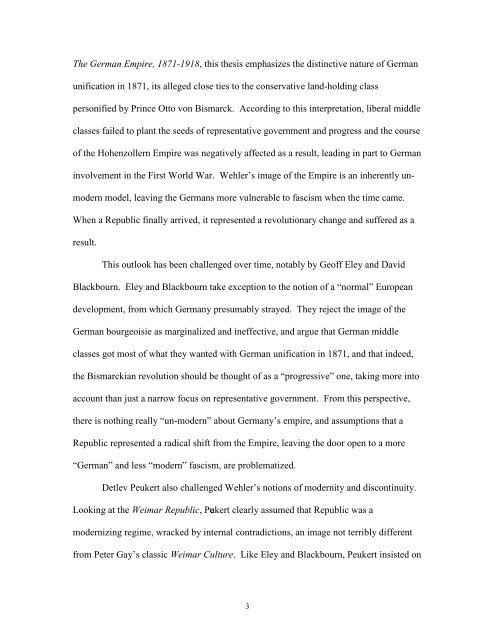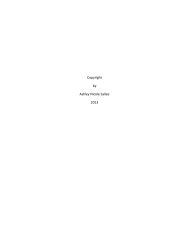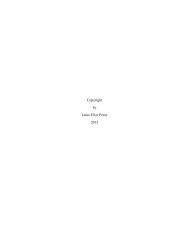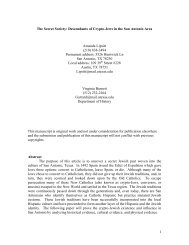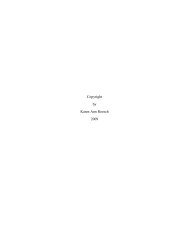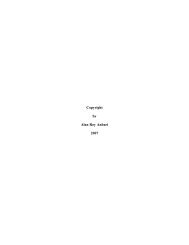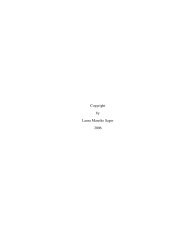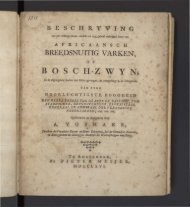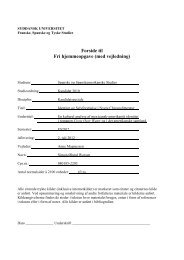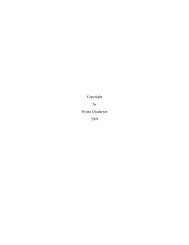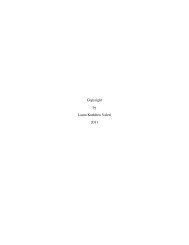- Page 1 and 2: The Dissertation Committee for Robe
- Page 3 and 4: To Nancy
- Page 5 and 6: Jews in Leipzig: Nationality and Co
- Page 7 and 8: Table of Contents: Introduction: Pg
- Page 9: Industry Chamber, not very unlike h
- Page 13 and 14: study focuses on Jews and their gov
- Page 15 and 16: Directors of the Gemeinde, and the
- Page 17 and 18: 4. The German Democratic Republic T
- Page 19 and 20: these studies that see more autonom
- Page 21 and 22: Those who did and returned saw a gr
- Page 23 and 24: Chapter 1: “no uniform community
- Page 25 and 26: 1871, the year of unification, ther
- Page 27 and 28: Felix Goldmann, who was the Reform
- Page 29 and 30: after two decades teaching at the
- Page 31 and 32: will help a considerable portion of
- Page 33 and 34: higher percentage of Jews than of t
- Page 35 and 36: community, more or less successful
- Page 37 and 38: Jewish Vereine during the Weimar pe
- Page 39 and 40: insistence on ideological conformit
- Page 41 and 42: There is sufficient evidence to sug
- Page 43 and 44: attempt, at least on the part of th
- Page 45 and 46: Exclusion from public life Jews wer
- Page 47 and 48: The representative of the Schulamt
- Page 49 and 50: the ban was already published, and
- Page 51 and 52: that the greatest number of the ben
- Page 53 and 54: Police President followed up in Jul
- Page 55 and 56: anned from the park, or at least th
- Page 57 and 58: Jews, to exclusion of Jews from the
- Page 59 and 60: epresentative that the community wo
- Page 61 and 62:
down synagogues, and he did not get
- Page 63 and 64:
to and watch the greetings of Jewis
- Page 65 and 66:
uilding, and that complaints would
- Page 67 and 68:
For the next several years, until K
- Page 69 and 70:
Over the course of early 1937, clas
- Page 71 and 72:
government activity in Leipzig. Man
- Page 73 and 74:
Similarly, when the staff of the an
- Page 75 and 76:
see many of the themes of the Jewis
- Page 77 and 78:
This group was more than the cream
- Page 79 and 80:
For the rest of 1935, there were fe
- Page 81 and 82:
esignation in February, and got it
- Page 83 and 84:
February 1936 of the head of the Fo
- Page 85 and 86:
earing of pennants in late 1934, 15
- Page 87 and 88:
“sacred tradition”. Palestine w
- Page 89 and 90:
Goldhaber even spoke of developing
- Page 91 and 92:
The State Zionists wrote back, prot
- Page 93 and 94:
conflict. It was everything Goldwas
- Page 95 and 96:
Goldwasser and the SZ spoke the sam
- Page 97 and 98:
German-speakers all over eastern an
- Page 99 and 100:
have used. “Volksbewusster” can
- Page 101 and 102:
fifteen in the spring of 1936. 201
- Page 103 and 104:
this vision of community did not so
- Page 105 and 106:
continued on surprisingly unchanged
- Page 107 and 108:
government had decided to expel for
- Page 109 and 110:
Matters deteriorated in Leipzig in
- Page 111 and 112:
and put on trains headed east. And
- Page 113 and 114:
neighboring houses. The destruction
- Page 115 and 116:
the day’s work. 237 Working from
- Page 117 and 118:
organizations. In October of that y
- Page 119 and 120:
can be viewed as non-existent. On t
- Page 121 and 122:
took part in the persecution of the
- Page 123 and 124:
ut during which the untenability of
- Page 125 and 126:
to the authorities as the more poli
- Page 127 and 128:
The appointment of Grunsfeld to the
- Page 129 and 130:
The case of the Muscatblatts points
- Page 131 and 132:
same: “If the company of the musi
- Page 133 and 134:
of the year. “If a large part of
- Page 135 and 136:
ecently been taken into the nearby
- Page 137 and 138:
least fourteen employees of the Gem
- Page 139 and 140:
Gemeinde had largely perished. Now,
- Page 141 and 142:
the camps between January 1942 and
- Page 143 and 144:
“Immediately after the liberation
- Page 145 and 146:
He traveled, and trained in London
- Page 147 and 148:
They were bombed out of their Juden
- Page 149 and 150:
ironically seeking refuge from anti
- Page 151 and 152:
In June, the Gemeinde sent a set of
- Page 153 and 154:
within the Gemeinde—many Jewish h
- Page 155 and 156:
The magazine described the lead cha
- Page 157 and 158:
over the quality of some lemon oil
- Page 159 and 160:
eing, though, this was a subtle pre
- Page 161 and 162:
judge, and Melzer was found guilty
- Page 163 and 164:
away from him in the process of “
- Page 165 and 166:
The case points out several of the
- Page 167 and 168:
Communist Party of Czechoslovakia.
- Page 169 and 170:
the last of twenty “stateless peo
- Page 171 and 172:
the court went so far as to blame t
- Page 173 and 174:
toward a new fascism from American
- Page 175 and 176:
wished to “begin a new mass murde
- Page 177 and 178:
center in the service of the USA. T
- Page 179 and 180:
is no sense from the proceedings th
- Page 181 and 182:
sentenced to death, his brother to
- Page 183 and 184:
Jews served multiple rhetorical fun
- Page 185 and 186:
“method of these criminals was to
- Page 187 and 188:
The Post also reported that the lis
- Page 189 and 190:
of the packets might address their
- Page 191 and 192:
the comments of the chair on the in
- Page 193 and 194:
government for returning and transi
- Page 195 and 196:
the Gemeinde—as in the case of th
- Page 197 and 198:
admission to practice would make a
- Page 199 and 200:
name was usually on correspondence
- Page 201 and 202:
A visit to the Gemeinde’s offices
- Page 203 and 204:
the case of Hertha Reder, who wrote
- Page 205 and 206:
the next day. 453 A leader in the B
- Page 207 and 208:
Chapter 6: Construction Will Commen
- Page 209 and 210:
estitution demands, or commit any o
- Page 211 and 212:
immediately dictated a letter of co
- Page 213 and 214:
Marks from the government to build
- Page 215 and 216:
status—because of his mishandling
- Page 217 and 218:
along with the cantor Werner Sander
- Page 219 and 220:
accusations against [leaders of the
- Page 221 and 222:
But he did not. In a sign that the
- Page 223 and 224:
one another, to define themselves a
- Page 225 and 226:
pronouncement of the state of party
- Page 227 and 228:
Much of the work of the Gemeinde wa
- Page 229 and 230:
difference. 517 The Gemeinde was ju
- Page 231 and 232:
to discuss the Globke case, and con
- Page 233 and 234:
conference did not attack Israel di
- Page 235 and 236:
newspaper, Prace, or Labor, and des
- Page 237 and 238:
None of these developments by thems
- Page 239 and 240:
Stasi [the East German secret polic
- Page 241 and 242:
get to know the Jewish culture. 545
- Page 243 and 244:
This German state saw Jews as impor
- Page 245 and 246:
surprising degree to their own devi
- Page 247 and 248:
people like Richard Frank and Fritz
- Page 249 and 250:
Bezirkstag und Rat des Bezirkes Lei
- Page 251 and 252:
Daniel Jonah Goldhagen, Hitler's Wi
- Page 253 and 254:
(Leipzig: 1994). Carol Rittner, Ste
- Page 255:
VITA Robert Allen Willingham II was


